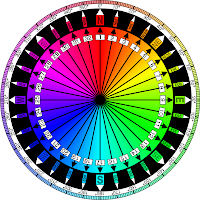"... Every crisis carries two elements, danger and opportunity. No matter the difficulty of the circumstances, no matter how dangerous the situation...at the heart of each crisis lies a tremendous opportunity. Great blessings lie ahead for the one who knows the secret of finding the opportunity within each crisis. ... " -Chinese Proverb
Mozilla is one of those companies who thrives on the web user's need for a better browser. As a pony with a few tricks, they can only go so far.
Mozilla's Strategic Position
Following is a listing of Mozilla's current (and possible) dilemmas:
How can Mozilla improve their situation especially when they are caught between a rock (the partnership with Google) and a hard place (the decline of Firefox users)?
Solution
#
Our Compass Forecast
In the information economy, transparency and safety are never guaranteed. The company who maintains the social-economic attention of those who desired attention and digital security, will always have a market.
Regardless how technology evolves, the offering of quality products and/or quality services is essential. Focusing on the basic users needs is paramount to one's success.
Developing digital security for all significant high-tech. devices is an unique niche that usually goes on a infinite mode. The evolutionary contest between the "black hat" hackers and the computer security developers (aka. the gatekeepers) is continuous. The gate keepers are focused on building a better wall. Occasionally, they might upgrade it by adding a few unique counter-offensive measures. ... Where the other side concentrates on the identification of the various weak points within the wall. Sometimes, the hackers win. For the time being, the developers are winning while the users are just surviving.
Side note
One exception to this scenario is the Blackberry phone . This device has great security features for those who can afford it. ... It seems that President Obama used to be a big user of this phone. ... Marketwise, it also does not appeal to the consumers for a myriad of reasons. ... Do not be surprised if a relevant party will buy RIM within the next 12 -18 months.
Rimunatons from the Compass Desk
In unsettling times, the successful strategists usually look past their own marketplace and focus on the various niches within the global digital marketing terrain, where one has a strong expertise and the competition is quite weak. Whatever specific area that they are weak at, the company will recruit the best.
When one becomes successful, he/she should be aware of the increased probability of newer competitors sprinting into their niche.
When assessing one's own competitive position in their specific market terrain, the chief decision makers must consider the connectivity of the following points: the configuration of their marketplace and beyond, the state of their organizational leadership, the logistics of building and maintaining their operation, the state of resources, the technology and the strategic gameplan.
By connecting the dots before the competition does, one can position themselves into a superior state of strategic effectiveness.
The question is, are you in that position (of strategic effectiveness) yet?


+800px-Compass.jpg)











